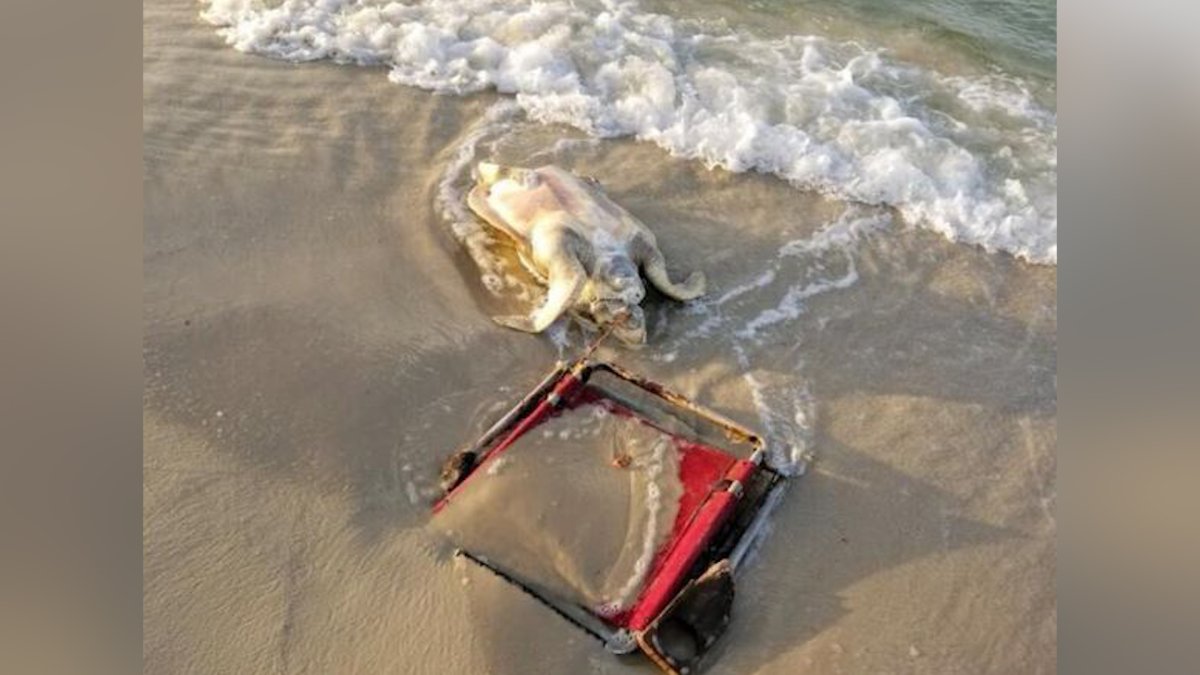WARNING: This post contains images that may be disturbing to some readers.

Beachgoers in Alabama are being told to pick up after themselves after a sea turtle was found dead caught in a chair.
In a Facebook post that has now gone viral, Fort Morgan Share the Beach notes the endangered Kemp’s ridley sea turtle was found with strings of a beach chair around its neck.
“This makes me so mad. How many hundreds of times do we have to ask people to pick their stuff up? It should just be common decency. I think I am going to print this out and carry it with me next time I have to ask,” the group administrator posted over the weekend.
READ MORE: The world is facing a massive pile-up of plastic trash
The turtle was found on the beach at the Bon Secour National Wildlife Refuge, ABC-affiliate WMBB reports, and the chair may have been in the water for a long period of time.
“The chair was around its head when they found it. The chair had barnacles on it so had been in the water for a while. So much stuff left on the beach washes into the gulf — why we need something like ‘Leave Only Footprints,'” Debbie Harbin with Share the Beach Fort Morgan told the site.
The community reacts
- What is a halal mortgage? How interest-free home financing works in Canada
- Ontario doctors offer solutions to help address shortage of family physicians
- ‘Dangerous message’: Experts slam anti-sunscreen claims circulating online
- Starbucks looks likely to win U.S. Supreme Court case involving pro-union workers
On Facebook, beachgoers in the area expressed their concerns with both the incident but some of the other issues with the beach itself.

“Exactly. But how did it get out there? It started somewhere, on some beach. That’s the point they’re making. Leaving things on the beach will work its way to the water’s edge and then into the ocean, ultimately killing something,” user Cheyenne Boslough said.
READ MORE: How waste ends up in our oceans
Others were outraged to see people leave their garbage on the beach.
“I have been on the beach during Spring Break and watched young people leave beer cans and all manner of things on the beach when they leave,” user Rodger D De Ramus wrote.
Wildlife in Canada
According to the Canadian Wildlife Federation, plastic pollution can threaten the lives of seabirds, marine mammals, sea turtles and other fish across the country.
“In Atlantic Canadian waters, Leatherback Sea Turtles usually feed on Lion’s Mane Jellyfish and on Moon Jellyfish. However, Leatherbacks are indiscriminate feeders, which means they’ll feed on anything that resembles jellyfish. This may be why Leatherbacks swallow marine debris such as plastic bags and deflated balloons. The plastic can block their gut causing them to starve, or it can prevent them from properly absorbing the nutrients in their diet,” the site notes.
READ MORE: Banning plastic straws — a look at how much it really helps, and who it could hurt
Not only is it recommended to pick up after yourself when you visit a body of water this summer, but the federation notes you should also try cutting down on plastic at home.
Stop purchasing bottled water, always cut six-pack rings and swap plastic for metal or wood cooking utensils.
“If you’re not reusing the plastic in your kitchen, please make good use of your recycling bins. Just think of all the plastic we could save from landfills and our waterways simply by using our recycling bins.”




Comments